WASHINGTON — The Washington Metropolitan Area Transit Authority (WMATA) has launched a new campaign aimed at fighting fare evasion.
According to a release from WMATA, people who are caught trying to leave without paying for their fare will be issued a citation during a warning period that began Oct. 4 and will end in November.
Fare evasion causes significant revenue loss for WMATA. The agency claims in 2022 it lost $40 million or 22% of the total upcoming budget gap.
WMATA says that people who neglect to pay fares may receive fines for fare evasion in each jurisdiction. According to the WMATA website, possible fines include $50 in D.C. and up to $100 in Virginia and Maryland.
The campaign includes digital signs throughout the system that will run for two weeks. Metro Transit Police officers and other Metro personnel will also be handing out fliers to riders with the same warning information.
"As I mentioned previously, the region needs to decide what we want Metro to be, and fare policy should be part of the conversation," said General Manager and Chief Executive Officer Randy Clarke. "Many people have mentioned going to a fare-free model, but fare-free does not mean free. There are costs associated with running the community’s transit system and therefore the necessary revenues must exist to deliver the services the community needs.”
WMATA says the campaign is designed to raise awareness of fines currently associated with Maryland and Virginia and inform those evading fares of the new civil penalties in D.C. that will take effect in November.
In Maryland and Virginia, fare evasion is a criminal offense.
"As part of the campaign, we are working with our local partners to offer resources to make public transit more equitable and affordable for those in need," WMATA officials said in a release. "A low-income fare pilot is getting underway in the District, in addition to a proposal to provide $100 in SmarTrip credit for qualified residents to ride buses and trains."
In November, Metro will begin testing faregate modifications as a preventative measure.
Some people have taken issues with WMATA's new approach, however. Jeremiah Lowery, advocacy director for the Washington Area Bicyclist Association said he's concerned WMATA's strategy could lead to transit inequity.
"Our elected leaders should always be looking at ways to make Metro more accessible for everyone," Lowery said. "This plan that they're rolling out, especially with the potential new gates could exclude more people."
The closures are a part of a roughly nine-month project to fix the Yellow Line tunnel and bridge and connect the new Potomac Yard station to the main railway system.

